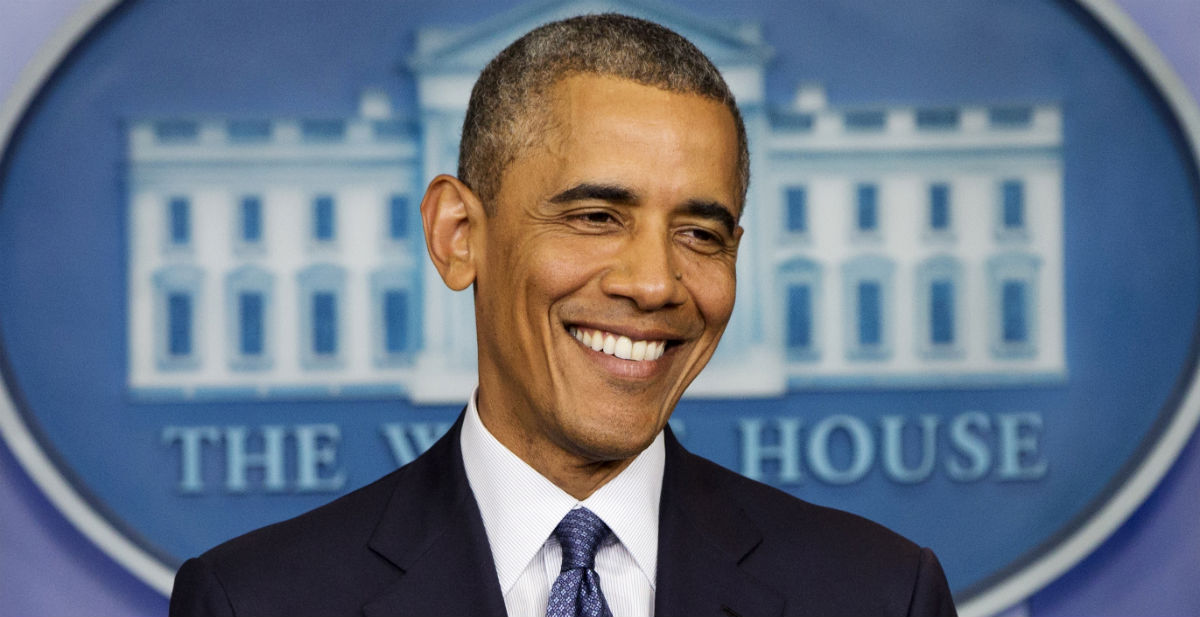On September 30, the Obama administration announced it would stop caring about civilians in Syria and Iraq who might be hurt by U.S. bombs.
Videos by Rare
Or rather, the drone strike standards that Obama instituted last year that were intended to diminish casualties would not apply in this new, beefed up campaign against the Islamic State of Syria and Iraq (ISIS) and its strongholds in those nations.
Snaps for honesty, Obama?
Or maybe, like his administration’s grand 2009 proclamation that the war on drugs was over, this casualness was always pure rhetoric.
Does anyone really think that government officials hold off on a missile strike, unless they want to?
The thing about life and death issues is that they’re life and death issues. You can give back stolen money and you can overturn bad laws, but you cannot fix dead.
Unfortunately, U.S. foreign policy has rarely reflected this truth.
Nor has it reflected the fact that people in other countries are as worthy of life as Americans. Both the government, and the public remain uninterested in this fact, which makes it much easier to repeat the error of armed interventions.
To say that what country you are born and reside in should not have any relevance to your right to life is not some neo-hippie declaration that it’s all, like, one world, man.
Rather, it’s an expression of exhausted befuddlement that the nation with such high ideals and noble sentiments written right into its founding documents has so often failed to realize that people in other countries are people with rights and such.
Rare contributor Aaron Rainwater wrote an October 1 piece about how the war in Iraq, and the subsequent nation building came at a terrible cost. It’s only a short piece, and Rainwater isn’t wrong about the futility and high financial cost ($800 billion) of trying to prop up Iraq. He isn’t wrong about the apparent incompetence of much of the Iraqi forces, whose swift retreat from ISIS has put primo U.S. weaponry into their hands.
Yet, in Rainwater’s article, the only body count listing from the conflict is the American one.
From this kind of myopic mourning to jokes about Americans winning World War II single-handedly (no help from Stalin’s cannon fodder, and the USSR’s 20 million dead), Americans prioritize American deaths.
There is — to a point — a benign logic to this. The relatively mild Boston Marathon bombing being more frightening than yet another car bomb that killed 20 times as many people in faraway Iraq makes sense. The trauma of 9/11 is perfectly understandable to anyone who was alive and able to understand the world on that day.
Closer to home, and more likely to include friends and loves ones means that an act of violence is more of a threat, and feels like more of a tragedy.
But it just feels like one. It’s actually no more, or no less of a tragedy than the deaths of any individual in any country.
Nearly everyone in Iraq has a friend or family member, or a home. The 650,000 to one million of them who lost their lives, and the 4.5 million displaced mattered just as much as any American would. Nor is little compelling evidence that these deaths were for any good reason.
And even if there were good reason, try explaining that to their surviving family members. Wouldn’t you mind if your city was bombed, even if it was for a “good cause”?
Very few people mourn Saddam Hussein, but a dictator often brings about a certain amount of stability to a country. The U.S.’s ill-advised invasion, and arrogant restructuring of the Iraqi government guaranteed resentment, leading to a brutal civil war between Sunni and Shia. Public health and infrastructure were already damaged by years of bombing after Gulf War I.
The bad that Saddam brought to Iraq was magnified by the West beyond belief.
The Iraqi civil war and the instability in Iraq should have made made ISIS’s rush to fill the resulting power vacuum unsurprising. What a propaganda coup for fundamentalist Islam: a ruined Iraq!
We should have seen this coming, and yet past disasters across the globe, from Vietnam to the U.S.’s first efforts at imperialism in Cuba and the Philippines in the 1890s seem to have had no effect on U.S. policy.
Only when there is a fresh enemy to attack does the U.S. suddenly develop humanitarian yearnings, as we did when we had to rescue the stranded Yazidi. Only when someone outside of the U.S. is killing civilians or violating sovereign borders is it an outrage, as with Putin’s eye on Ukraine.
And, even well-meaning thinkers like Rainwater — even ones who agree the war in Iraq was a grave mistake — invariably prioritize American interests over what countless individuals in other nations have lost.
As a nation, America is barely over 9/11 psychologically. Policy-wise, we’re still in the thick of it. From the broadness of the 2001 Authorization for Use of Military Force (AUMF), to the NSA’s spy dragnet, that attack, and those 3000 dead still cause tremendous ripples in everything we do.
Those 3000 dead were a tragedy, but not the biggest tragedy in human history.
What would we do if one million Americans died because of a foreign invasion? What would do if the rest of the world bombed us unceasingly?
Answer: We would never, ever get over it.
And yet we expect to leave no muddy footprints when we stomp all over the globe. ISIS formed in the muck of one of those footprints. So did much hatred of the U.S., and desire to hurt even its most innocent civilians.
This murderous hatred was encouraged by the loss of hundreds of thousands of Iraqis, who are, after all, human beings just like us.



